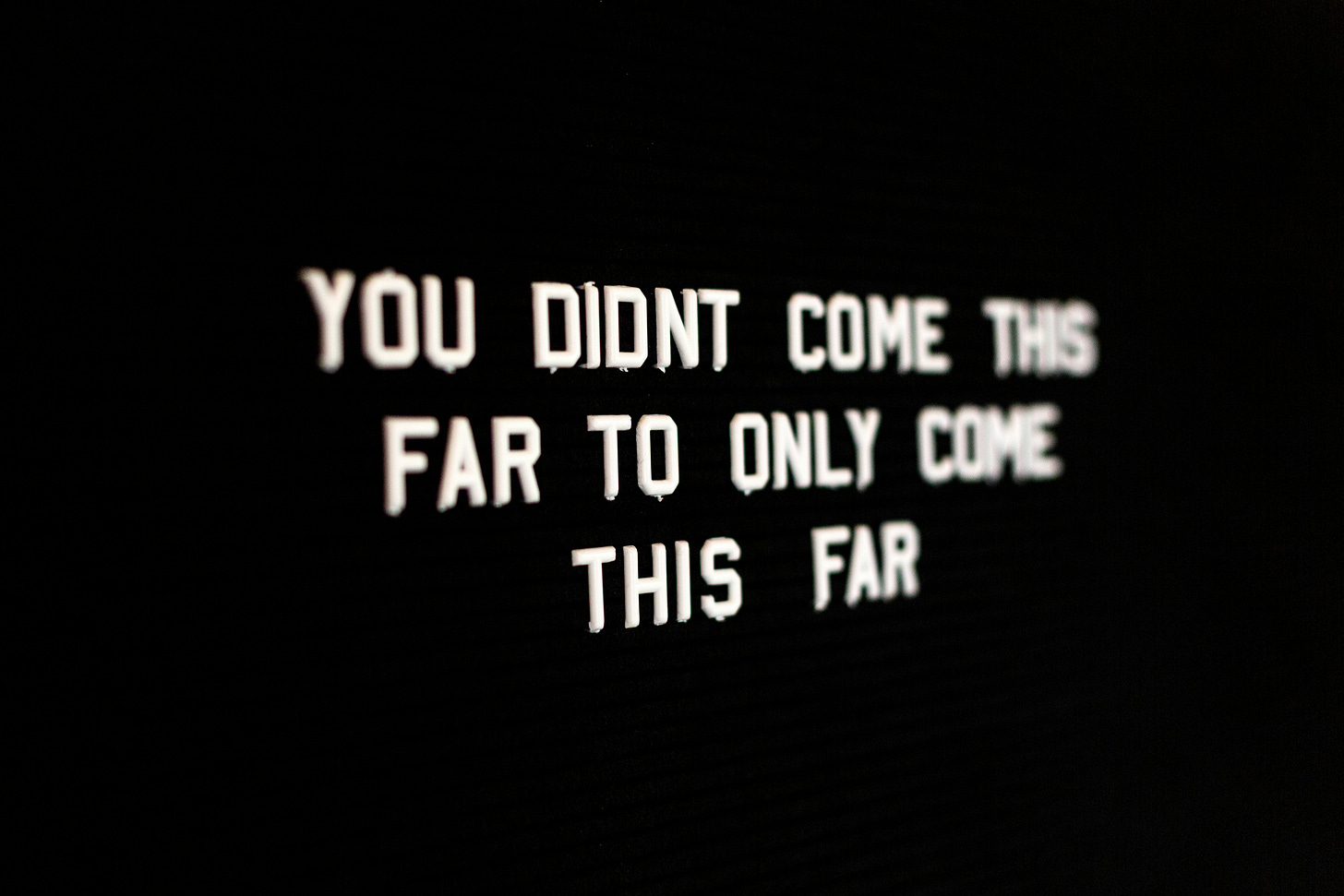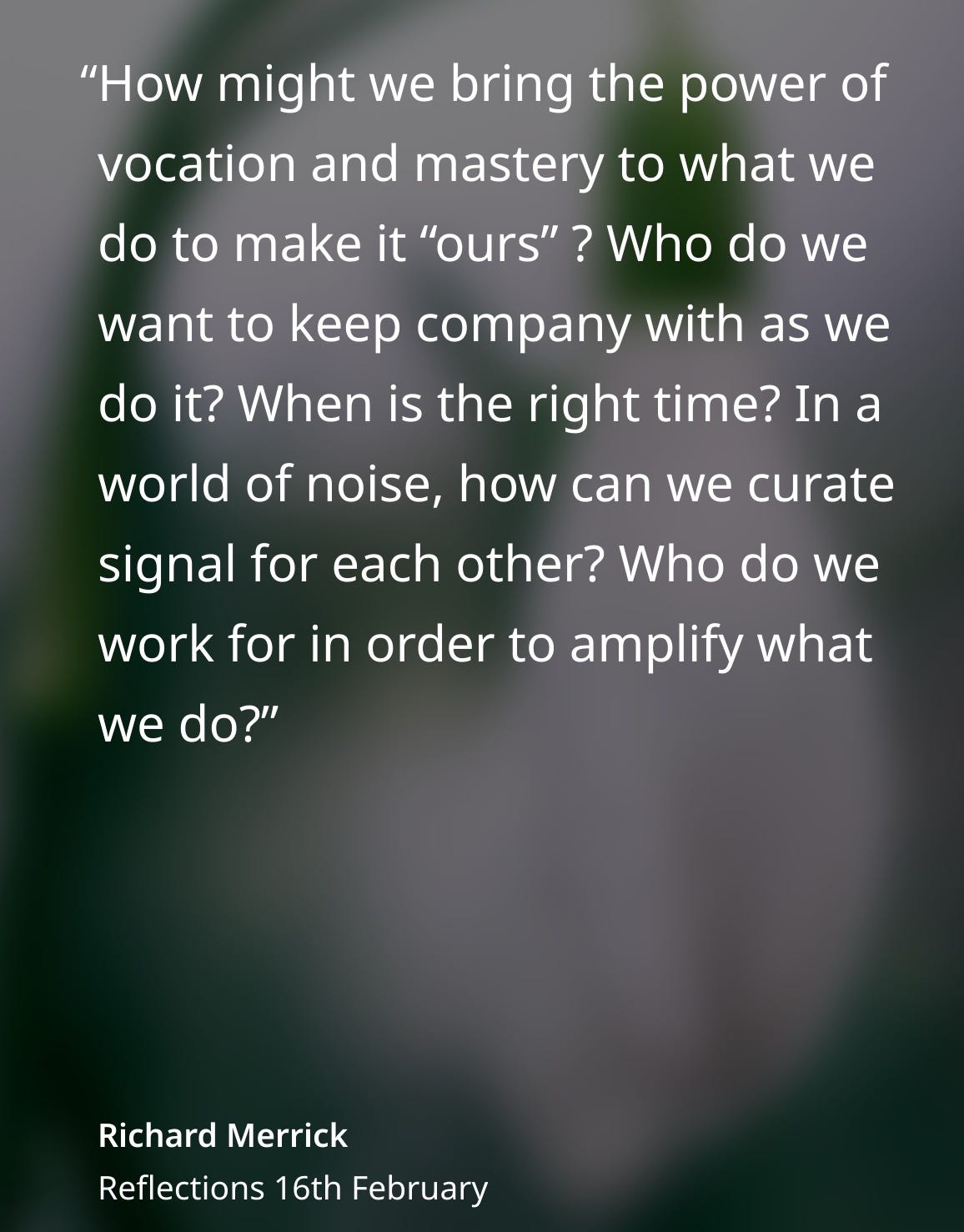What is a Vocation Today?
the times, they are a changing...
Vocation is one of those words that has become as marginalised as the jobs it describes in a world measured and valued in money.
The mindset which sees technology, engineering, mathematics and science as one kind of serious, disciplined, intelligent, valuable activity and the arts as frivolous, emotional, as some kind of peripheral, infantile activity could not be more wrong. The musician Soweto Kinch told me that it’s common for people to think of the arts as ‘a bit like dessert: unnecessary and probably bad for you.’
The same applies to vocations - the jobs that people choose to do not because they cannot do anything else but rather because they cannot otherwise be themselves. The people the Government asked us to clap during the Pandemic before going back to screwing them again.
Vocation is one of the five key areas I am thinking about as work changes:
The more I think about it and read about the history of ideas of vocation and calling, the more I understand how shallow my thinking has been. I suspect that, like many others, I have put “vocation” too easily it into a “type of job” bucket - teachers, nurses, priests, and the rest. I am beginning to understand just how thin that definition is and how much power the idea of vocation carries.
We can label a job a vocation and miss the point entirely.
A vocation is a relationship with something we are about to do. It may aggregate over time to be recognisable as a “job”, but it comprises thousands of small decisions about what we do next. How much of ourselves do we put into it? How much does it teach us that we want to learn? What difference will it make? Every small thing we do defines us and gives us a chance to learn.
In his book, The Great Work of Your Life Stephen Cope makes frequent references to spiritual works, principally the Bhagavad Gita, but also others, and identifies a theme that links them. A line from the Gnostic Gospel of Thomas resonates:
“If you bring forth what is within you, it will save you; if you do not bring forth what is within you, it will destroy you.”
Whilst very Biblical in tone, for obvious reasons, it also crops up in a similar form in other places, including the works of Carl Jung. Leaving aside for a moment the phrase's provenance, it strikes home. Every day, we do work, often within guidelines determined by others, parts of which are less than we could do left to our own devices.
I find that an excruciating idea - to deliver less than we are capable of because that is all that is required of us. We know that the paintings of the Great Masters were often painted substantially by apprentices, under the guidance and tutelage of Masters - but what must it have been like to be an apprentice painting something you know you could bring more light to? I sometimes wonder what Shakespeare’s school reports looked like - “William is often inattentive in class, and insists on writing what he wants rather than what is on the blackboard..”
Now, as so many find themselves doing mediocre work under the guidance of “best practice process”, worrying that their enforced mediocrity may be assigned to AI, what does that signal to us?
The vocation of the artisan demands that whatever they do next, no matter how small, from preparing a tool to finishing a sentence, is done to the best of their ability. Artisans grow and develop through deliberate practice:
Deliberate practice is really a kind of sophisticated attentional training. It bears fruit when attention begins to penetrate the object of its interest in an entirely new way. With sustained practice, the master’s perception of the object becomes refined. Aspects of the object that had previously been out of perceptual range begin to come into perceptual range.
The Great Work of Your Life. Stephen Cope. p118
This sort of attention - perhaps a form of love - in relation to the work in hand is not something AI does. The reality is we are not in competition with AI, we are in a dance with it, working out where we each fit. If we fight AI for what it does better than we do, we’re on a hiding to nothing; if, on the other hand, we learn how to use it, we are opening up whole new possibilities. The challenge for us is finding the space to dance.
We are also not in competition with the market in the the way that employees are. Employee benchmarks are market rates determined by competition. For those with a vocation, artisans, it is opportunity cost - how much will it take to divert us from the work we love?
As artisans, how might we think about our personal portfolio - doing work for pay to keep the lights on and the work we do for love, whose value we don’t know before we present it to the market?
The question it leaves, for me writing this sentence, to whatever you are doing now, is how much of it is feeding that individual gift we all have that, recognised and nurtured, that can be expressed as vocation, how much are we doing just to keep the lights on, and how do we want to shape the balance going forward?
Have a great day. Do something few other people can…..




This piece resonates with me Richard. In particular "I find that an excruciating idea - to deliver less than we are capable of because that is all that is required of us".
This, as you well know, is because of the separation of intellect from hand where in business Management does the thinking and workers the doing... Add to this the current trend in businesses to employ cheaper labour because of their increased costs, rather than compensating for it by reducing their 'profits'...